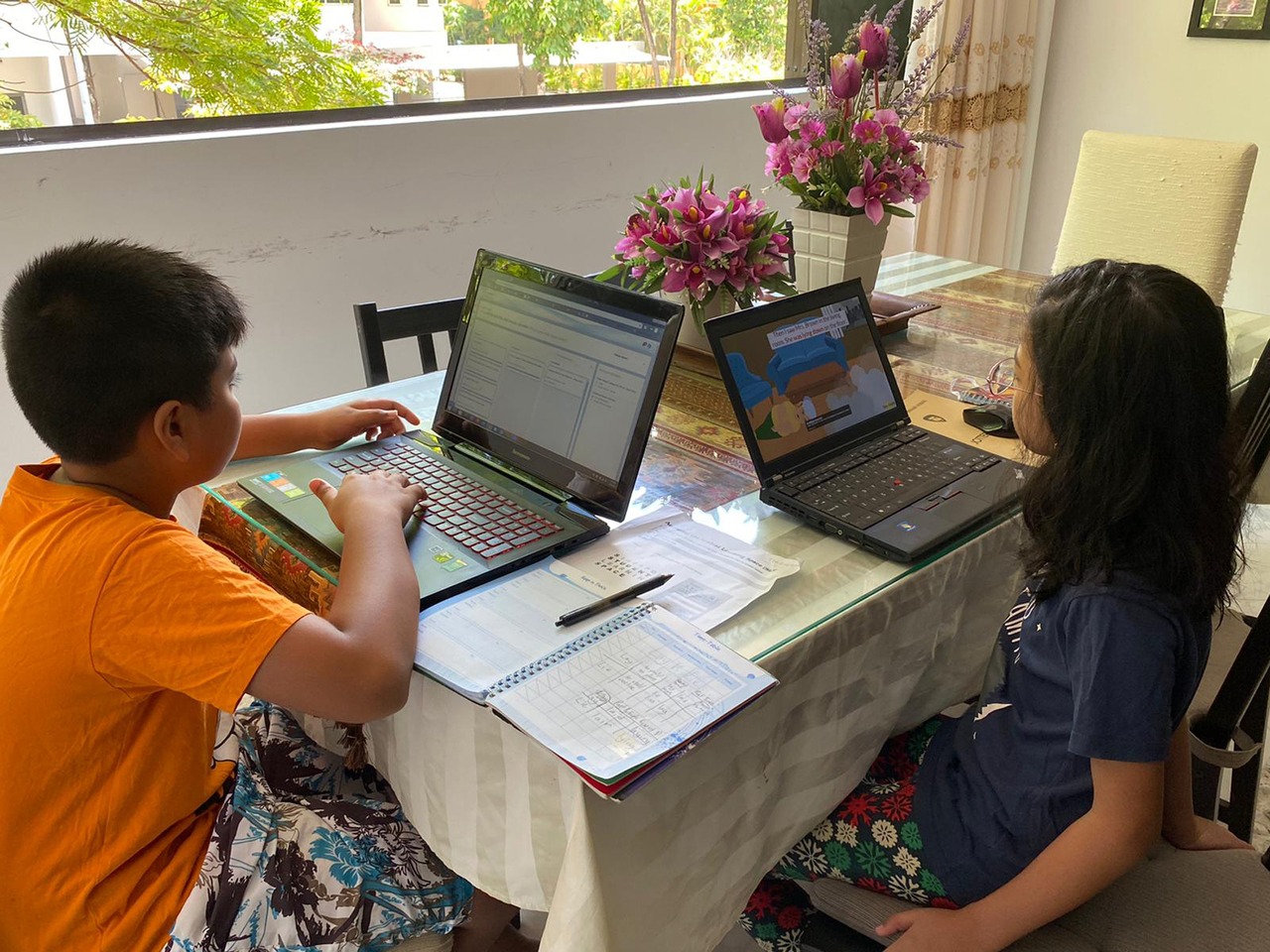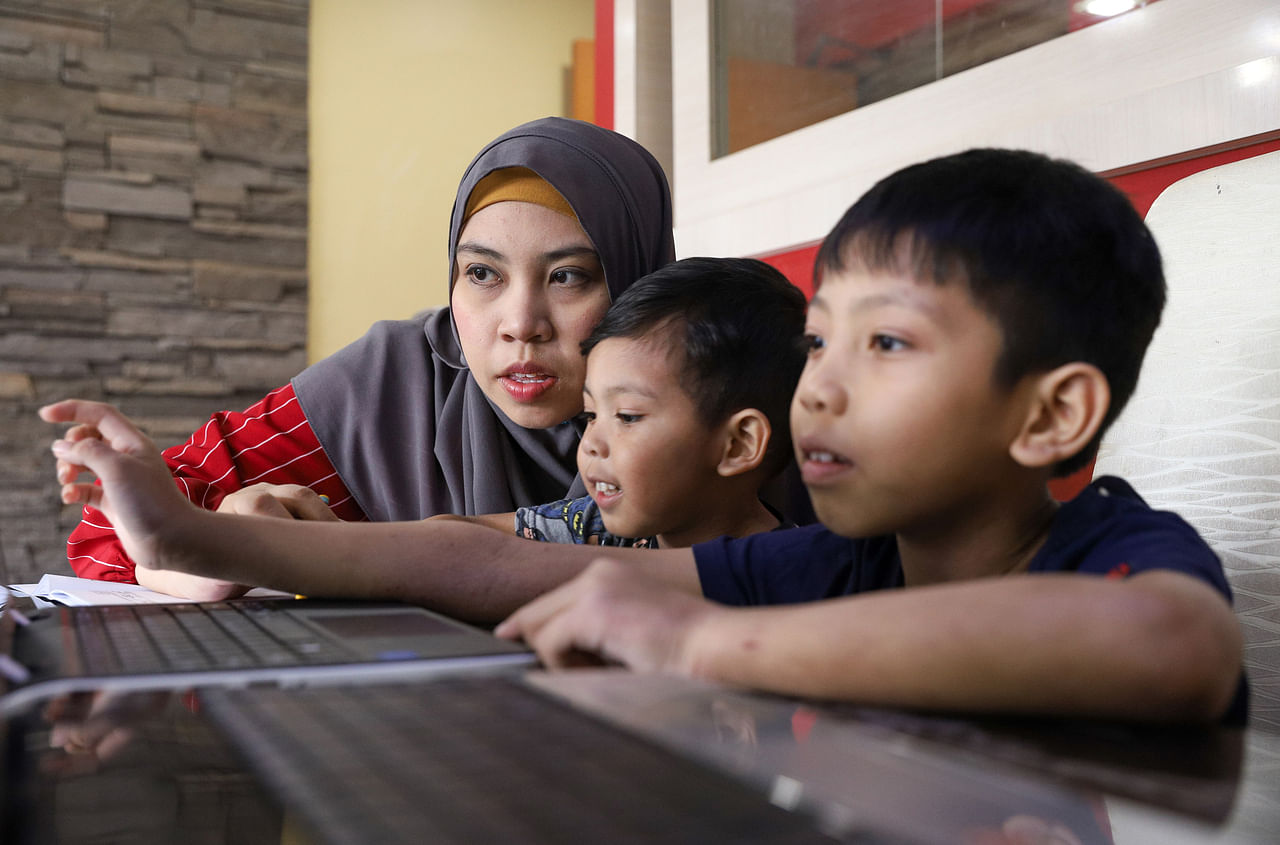COVID-19 SPECIAL
Coronavirus: 7 ways to thrive under home-based learning
Sign up now: Get ST's newsletters delivered to your inbox

Parents can help their child become more self-directed by allocating check-in times for their child to review his tasks
PHOTO: FADLIN M YUSOFF
Follow topic:
SINGAPORE - Tearing your hair out over home-based learning (HBL), which started on Wednesday and is set to continue till May 4?
Fret not. Here are some suggestions from academic and parenting experts, who advise thinking out of the box and letting the teachers get on with their job, albeit remotely, while schools are closed.
Here is how parents can keep sane while optimising this time to help their children make true learning gains.
More HBL resources for parents can also be found on MOE's website.
1. HONE SELF-DIRECTED LEARNING
It is a good time to help the children develop self-directed learning abilities, says Dr Tan Seng Chee, an associate professor at National Institute of Education (NIE), Nanyang Technological University (NTU).
There are many reasons why it is not feasible for parents to take the place of teachers. Subject teachers may have specialised approaches, especially at higher grade levels, while parents working from home have other demands on their time and attention, he says.
But parents can help their child become more self-directed by allocating check-in times for their child to review his tasks; or by asking the child to list ways he can improve his own planning and learning.
Parents can also translate knowledge into real-life applications, which boosts self-directed learning, Dr Tan says.
For instance, a parent can explain to her child how a camera works or seek the answers together with her child.
2. SUPPORT THE TEACHERS
Dr Tan suggests leveraging the expertise of support groups such as teachers, many of whom have already set up WhatsApp groups with parents.
Better yet, form your own supportive community online.
"Parents also need to recognise that many teachers are also parents, who need to take care of their children. With this understanding, parents with more capacity can step up to help other parents or children," he says.
3. PARENTS SET THE TONE
Mr Andrew Kang, chief executive officer of Cherrr, an online learning platform that offers livestreamed tuition lessons, says that the atmosphere of the home is set and largely determined by parents. "Don't frustrate and exasperate your children. Many times at home, parents can get impatient with their kids," he says.

nanadira - BH20200408_202078792129. MARCELLIN LOPEZ. Nadira Binte Mohd Ardi, 34, an Officer in the education sector, pictured helping her children (from left) Ayden Ihsan, 4, and Sufi Irfan, 8, with their home-based learning work at their home at Yishun Avenue 9, April 8, 2020.
PHOTO: BH
The father of four recommends that parents be "hands-on in observing, understanding and supporting" their child's HBL.
Mr Kang, who has 16 years' experience as a teacher, says: "HBL lessons are carefully planned by school teachers to ensure learning. So the HBL work is quite sufficient, if done properly.
"Develop empathy for their children's struggles at school as the subjects are difficult."
4. TAKE TIPS FROM HOMESCHOOLERS
Ms Dawn Fung, a mother of three and the founder of Homeschool Singapore, a community of homeschoolers, says: "Have realistic expectations. When you first homeschool, you will find that the root of the frustration lies in your expectations about what your child should be like throughout the day.
"It will come as a shock to you that young children do not behave as you think they should, like sitting quietly for hours to do seatwork."
Homeschooling is largely about parenting well, she says. If you are fixated on your children's ability to finish assignments on time before going back to school, you will end up frustrated.
"Focus instead on outcomes that make sense for the family. Is it time for the older children to reduce noise when the baby is asleep? Teach them to be mindful of one another so that everyone learns to be considerate. This will make it easier to cope with being indoors for a long time," she says.
5. MAKE USE OF YOUR HOME ENVIRONMENT
Set up your home environment to work for you, suggests Ms Fung.
Use apps like Overdrive to borrow online books and choose online programs to help kids learn about the world. BrainPOP, which has short animated movies, quizzes and materials covering subjects like science, social studies, engineering and technology, health, and arts and music, is a good resource.
She suggests: Fill up the kitchen larder, but use the time to cook as an opportunity to bond and learn about math (baking, measuring), science (heat, materials) languages (what the items are called, and the recipes you read).
"Now your entire home becomes a learning environment," she adds.
6. DON'T OBSESS ABOUT HBL
Ms Winny Lu, senior counsellor, Reach Community Services, cautions: "We may focus too much on HBL and neglect the bond between the parent and child."
Remember to communicate your love for your child and bond via family activities such as cooking, art and crafts, indoor gardening, reading together, watching sports, engaging in exercise and dancing, or watching movies.
Older children can be enlisted to take on new chores and responsibilities.
The initial stages of HBL is a time of adjustment for the child so parents should consider easing the burden when it comes to online tuition sessions or additional assessment books, she says.
Parents should also set aside quality time for themselves and show appreciation to each other as they learn to adjust as well.
"This is not a time for you to dwell on hurts from the past. This is the time for you to bond as a strong team to manage the challenges instead of functioning as individuals," she says.
7. TALK TO THE KIDS ABOUT COVID-19
Mrs Joanna Koh-Hoe, chief executive officer of Focus on the Family Singapore, advises using the time to build up resilience.
"If our children aren't talking to us but are feeling the similar effects of Covid-19 as the rest of the world ,there might not be any healthy outlet for them to process their thoughts and manage their emotions," she says.
She suggests five areas where parents can engage their children in age-appropriate ways, such as talking about health and hygiene; fears and anxieties; how the country and government are responding; service and compassion for others; and life and death.
More ideas can be found at the Focus on the Family Singapore website.
Think of fun family projects to do together, such as by paying tribute to frontline workers with a simple social media post.
"Research has shown that helping others is a good way to help ourselves. That's one way to look beyond ourselves and not just survive, but thrive in this standstill," she says.

